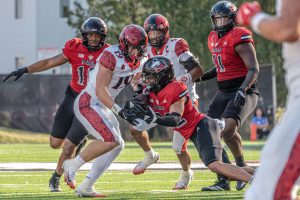Founders lab implements new card swipe system for printouts
March 18, 2004
Founders Memorial Library’s computer lab is the first to test a new print technology by Information Technology Services.
Patrons at the lab will have to go to a release station, select the documents they want printed and slide their NIU OneCards.
If a document is more than 16 pages or there are multiple copies, they won’t print.
Those rules have been in effect in the computer labs since the early 1980s.
Cindy Phillips, director of NIU Telecommunications, said this technology will determine how much paper students use in the labs.
The technology has been used since the beginning of Spring Break.
Phillips said they decided to put it in the library lab because no classes are held there and it was open during break.
Eventually, this new system will be in place at all computer labs on campus, Phillips said.
“We’ll see what bugs there are and look at the problems that occur,” she said. “At the end of the spring semester, we will make some determination.”
Christopher Boughton, technology supervisor at Founders Memorial Library’s computer lab, said no major problems have occurred.
“It’s just a trial at this stage,” he said. “I haven’t received any written complaints.”
Phillips said she has received numerous questions from students about whether they will be charged for paper.
She said that is not the case, and the system is to stop students from printing more than what’s allowed to save ITS money.
“It could be a necessary evil,” she said.
Another option is to designate students a certain number of pages per semester and charge them for going over. Some institutions use that system, Phillips said.
Phillips said that usually computer lab attendants are supposed to make sure patrons don’t break lab rules.
But sometimes, she said, patrons might pressure the attendant to give them the printout even though rules were broken. With the new system, the extra papers won’t print.
According to an ITS press release, the cost of lab printing has increased about 10 to 15 percent every year for the past 10 years.
ITS has not received more funding to help with the increase.






